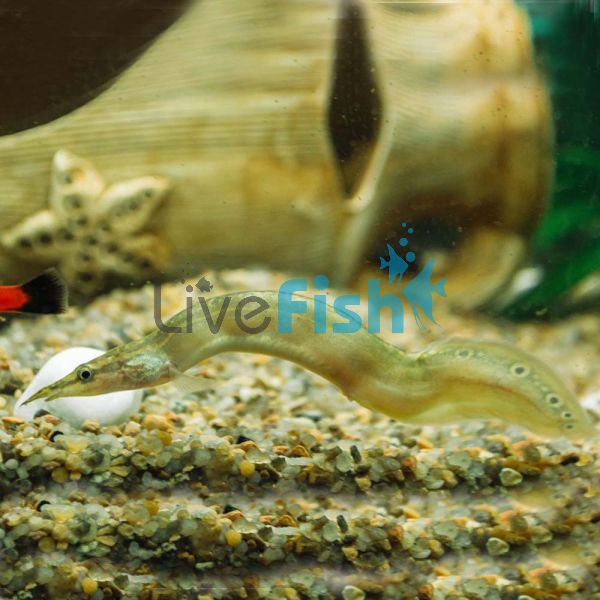Spiney Eel 15cm
The spiny eel is quite easily one of the best oddball aquarium fish for smaller aquariums. This unique fish reaches around 15 cm and is actually not a true eel but more closely related to loaches. Spiny eels would make a great centrepiece fish for relatively small aquariums and would be a really cool saltwater eel alternative. For any non-aquarists you can for sure pretend that these are a small moray eel for coolness points.
Spiny Eel
The spiny eel is quite easily one of the best oddball aquarium fish for smaller aquariums. This unique fish reaches around 15 cm and is not a true eel but more closely related to loaches. Spiny eels would make a great centrepiece fish for relatively small aquariums and would be a cool saltwater eel alternative. For any non-aquarists, you can for sure pretend that these are a small moray eel for coolness points.
Spiny eels are not really that spiny, they may get this name because of the really pointed nose they have which is used to sift and burrow into the sand. These fish do have a really interesting colour palette with a range of brown and yellow shaded stripes running from head to tail. They also have an assortment of black spots which are found near the end of the eel. Though the spiny eel does not have incredibly bright colours, they do offer a lot in their behavior. Part of the enjoyment when keeping this fish is trying to find it in the aquarium since they spend a lot of time burrowed under the sand. Their reclusive but calculated behavior offers hours of fun and the occasional moment of panic when you have trouble finding them.
Breeding spiny eels in captivity have been documented in the past but it does seem to be a fluke occurrence as these fish often require specific environmental conditions when breeding. Females and males do look identical and it is usually best to keep them in a group if the intention is to breed them. Having a lot of dense vegetation in the tank helps as these fish seem to spawn in the plants. The wild origin of the spiny eel is widespread throughout South-East Asia.
Tank Recommendations for your Spiny Eel
Since the spiny eel only reaches around 15 cm as an adult they can be kept in smaller aquariums as long as the habitat is ideal. The minimum aquarium volume for this fish would be 70 liters, it is best to go for longer and wider tanks than taller ones. Spiny eels spend a lot of their time near the bottom of the tank and in the substrate. Though they can be kept in a bare bottom tank, it’s best to have a soft sandy substrate layer in the tank.
Rock caves and driftwood can be added for additional cover along with plants which create a natural habitat. Having a lot of sheltered areas may encourage the spiny eel to spend more time in the open as it knows that hiding places are readily available. Spiny eels are tropical fish that prefer temperatures between 24 - 27 degrees.
Suitable Tank Buddies
Spiny eels can be kept together in groups or solitary. They are not predator fish and can be kept in a range of community settings however it's best to avoid any slow-moving or incredibly slow-moving fish as these may become potential meals.
Usually Compatible
Giant Danios, Congo tetras, clown Rasbora, angelfish, and any mid to top-dwelling fish, just ensure that the spiny eels have the substrate layer to themselves.
Sometimes Compatible
Dwarf cichlids like Apistogramma, rams, and potentially aggressive fish such as red tail sharks, rainbow sharks, and similar species. Since spiny eels are exclusively bottom-dwelling, they can be easily outcompeted and this should be considered.
Rarely Compatible
Large and aggressive species that would prey on the spiny eels or any easy prey for the eel like shrimp, guppy fry, and possibly neon tetras.
Feeding your Spiny Eel
As the spiny eels live near the bottom of the aquarium it's best to feed them sinking foods. They may not take to pellets right away so they may require frozen or live invertebrate-based foods like black worms, brine shrimp, and similar foods. Once they are feeding, the transition can be made to a nano-sinking pellet.
| Scientific Name | Macrognathus aculeatus |
|---|---|
| Care Level | Easy |
| Common Names | Spotted Spiny eel, Spiny eel, freshwater spiny eel |
| Diet | Carnivore |
| Fish Family | Mastacembelidae |
| Lifespan (years) | 10 |
| Max. Length (cm) | 15 |
| Min. Tank Volume (l) | 70 Liters |
| Origin | South - East Asia |
| Reef Safe | Yes |
| Sociability | Peaceful |
| Venomous | No |
| Water Conditions | 24-26° C, pH 6.0-7.0 |




